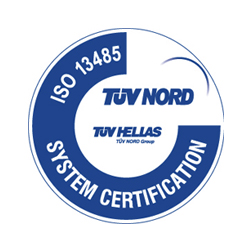OUR PRODUCTS
Τι είναι το iDNA NutriGenetix ;
iDNA NutriGenetix is an in vitro diagnostic (IVD) product, which includes genetic analysis of an oral swab sample and recording of personal phenotypic characteristics through a health and lifestyle questionnaire. It presents the needs of the individual with the aim to achieve their personal health goal as well as an individualized diet plan.
Στόχος του είναι η πρόληψη μεταβολικών ασθενειών και άλλων συμπτωμάτων, διαταραχών, ή ασθενειών που σχετίζονται με τις διατροφικές συνήθειες, παρέχοντας έτσι ένα ολοκληρωμένο εργαλείο για βέλτιστη υγεία.
Τι είναι η Διατροφογονιδιωματική;
Η Διατροφογονιδιωματική (Διατροφογενομική & Διατροφογενετική) είναι ο επιστημονικός τομέας που στοχεύει στον εντοπισμό των αλληλεπιδράσεων μεταξύ γονιδίων και παραγόντων που σχετίζονται με τις διατροφικές διεργασίες.
Πώς γίνεται το τεστ;
Το iDNA NutriGenetix kit έχει σχεδιαστεί ως ένα εύκολο και ανώδυνο τεστ το οποίο δίνει πληροφορίες για Το iDNA NutriGenetix μπορεί να συμβάλει στην εκτίμηση κινδύνου και να βοηθήσει τη διαχείριση της παχυσαρκίας μέσα από εξατομικευμένες συμβουλές διατροφής. Για τη γενετική ανάλυση απαιτείται η λήψη δείγματος, ανώδυνα με χρήση μπατονέτας, από στοματικό επίχρισμα. Έπειτα, το δείγμα αποστέλλεται στο πιστοποιημένο εργαστήριο της iDNA Laboratories, όπου γίνεται η απομόνωση και η γονοτύπηση του DNA σας. Εντός 20 εργασίμων ημερών λαμβάνετε το εξατομικευμένο report αποτελεσμάτων στον προσωπικό σας λογαριασμό στην ηλεκτρονική πλατφόρμα myEMR.
Ποια είναι η διαδικασία για την πραγματοποίηση του τεστ;
Η διαδικασία που πρέπει να ακολουθήσει ο ενδιαφερόμενος είναι εύκολη και γρήγορη. Αγοράζει το iDNA NutriGenetix, δημιουργεί λογαριασμό στην πλατφόρμα myemr.idna.gr, καταχωρεί το serial number και τα στοιχεία του, συμπληρώνει το ερωτηματολόγιο και στέλνει το δείγμα παρειακού επιχρίσματος στο εργαστήριο της iDNA Laboratories.
Εντός 20 εργασίμων ημερών λαμβάνει το εξατομικευμένο report αποτελεσμάτων στο λογαριασμό του μέσα στην ηλεκτρονική πλατφόρμα myEMR.
Είναι ασφαλές το iDNA NutriGenetix;
Δεν υπάρχει απολύτως κανένας κίνδυνος από τη διενέργεια του τεστ. Η λήψη στοματικού (παρειακού) επιχρίσματος είναι απλή, γρήγορη και ανώδυνη.
Σε ποιους απευθύνεται;
To iDNA NutriGenetix kit απευθύνεται σε άτομα με:
- Body weight issues
- Obesity-related diseases such as Insulin Resistance, Type II Diabetes Mellitus, Hypertension and Cardiovascular Diseases, Metabolic Syndrome
- A family history of obesity-related chronic conditions
- Disease risk factors, e.g., hypercholesterolemia, pre-diabetes
- A particular interest in overall health and prevention (health-conscious)
- "Restrictive" diets due to lack of time or personal preference
Τι είναι η εξατομικευμένη διατροφή;
Η εξατομικευμένη διατροφή ή διατροφή ακριβείας (Personalised Nutrition – PN) ορίζεται ως το σύνολο των ειδικά σχεδιασμένων διατροφικών συμβουλών που βασίζονται σε ατομικές πληροφορίες, όπως ο γονότυπος, ο φαινότυπος και ο τρόπος ζωής.
What are Nutrition & Exercise DNA Tests?
Nutrition & Exercise DNA Tests study how our genes affect nutrient metabolism from the food we eat, the elimination rate of toxins, our predisposition to weight gain, as well as our body's response to various types of exercise and many other activities.
What are Nutrition, Sports & Exercise Genomics?
Nutritional Genomics (Nutrigenetics & Nutrigenomics) examine the interactions between genes and nutrition in relation to health. Personalised / Precision Nutrition (PN) is defined as the set of specially designed nutrition tips based on an individual’s genotype, phenotype and lifestyle information and aim at improving eating behaviour for better health.
Sport and Exercise Genomics focus on understanding the genome in relation to athletic performance. An individual's athletic ability is determined by two key factors: his genome and the environment, making athletic performance a complex phenotype. Genetic polymorphisms affect metabolic processes in the human body, such as performance, endurance, muscle fiber components, neuromuscular coordination and oxygen uptake.
What is the benefit of this test for me?
We are all different and this is why there is no diet and exercise plan that suits everyone, i.e. ‘no size fits all’. The genetic information included in your personal genetic analysis will provide you with a deeper understanding of your needs, thus you can choose the appropriate diet plan exercise programme for you.
Keep in mind that genetics is one of many factors that contribute to our health and well-being. Therefore, for the best results, please use your genetic profile as part of the overall picture and not individually.
How often do I need to take the DNA test?
Our DNA does not change. You can take the iDNA Genomics test once in a lifetime, without the need for repetition. You will therefore be able to make your own personalised plan, based on your own, unique genetic profile.
What is the process during which my DNA is analysed and how my own analysis report is extracted?
Saliva contains DNA, which is derived from the oral cavity cells. We send you a complete saliva collection kit and instructions for collecting your sample.
After we have received your saliva sample, our ISO certified laboratory isolates the DNA from your sample. The iDNA Genomics lab then uses state-of-the-art genetic testing procedures to analyse your DNA.
What is the amount of saliva that needs to be sent?
It is crucial to follow the procedure described in the PROCESS section to ensure that the sample size is sufficient to isolate DNA. In the test kit, you will find 2 sterile saliva swabs, each further packaged in a special collection tube. You need to follow the saliva collection procedure exactly as described in the instructions. It is very important to collect the sample with approximately 20 intense rotational movements, up and down, on each cheek. for at least 1 minute in total.
What is the information I will receive through my personal analysis report?
In the PRODUCTS section, you can find in detail all the pilars and categories of analysis provided by the results report in each test. The genetic test provides the analysis of our genetic profile on aspects such as predispositions and nutrient needs, so that our diet and sports choices can become personalised.
Learn more here
How will I receive my personal analysis report?
Your personalized report will be accessible in your myEMR account within 20 business days from the day our laboratory receives your saliva sample.
What does my personal analysis report have to do with my current health status?
Your personal genetic analysis shows your genetic predisposition in relation to weight management, nutrient metabolism, heart health, food sensitivities, injury predisposition, as well as predisposition for high performance in specific sports. If your genetic test shows, for example, that you have a ‘High Sensitivity’ profile for a specific vitamin metabolism, this does not necessarily mean that a blood test will show a deficiency in this vitamin. After all, vitamin levels depend on many factors, such as the intake of this vitamin through the diet and the interaction with other nutrients. This knowledge shows the body's predisposition to deficiency and has an advisory role in choosing the appropriate diet for optimal health.
Can I interpret my own genetic analysis results, or do I need expert consultation?
It is important to note that genetics is one of many factors that contribute to our health and well-being. Therefore, for the best results, it is recommended you use your genetic profile as part of the overall picture and not individually. Please read your analysis carefully. To make the most of the information provided, discuss the results with your nutritionist, your trainer or your physician, who are able to help you make individualised recommendations based on your personal genotype, phenotype, medical history and lifestyle.
What is the basis of the genetic analysis results?
The report of the results of each personal genetic analysis is based on the latest documented scientific research that has been published in scientific journals, through the process of peer-review and have been evaluated by the scientific team of iDNA Genomics. Each report is based on published research investigating the effects of nutrition, exercise and many other factors that affect health and well-being.
What is DNA?
DNA or deoxyribonucleic acid is the cell’s genetic material, packed in units called genes, and contains all the information necessary for all body functions. Genes are the basic unit of heredity and the information they carry determines individuals’ unique characteristics, such as height and eye color. DNA is found in almost all cells of our body (e.g. saliva, skin, etc.).
What is a gene?
Nucleotide sequences in DNA dictate protein synthesis. Proteins are basic functional biological molecules in our body, performing all processes: from signalling and responding to external stimuli to metabolism. The organism’s complete set of genetic material, the complete set of genes, is known as the genome.
What are genetic polymorphisms?
Human DNA is approximately 99.9% identical from person to person. However, there are small differences that make each person unique. These differences are called Single Nucleotide Polymorphisms (SNPs). Some of these variations are associated with certain, unique individual traits or may be linked to a genetic predisposition, which results in differentiated biological function or traits, compared with other individuals. This differentiation may be associated with differentiated needs for exogenous factors (such as nutrition), which need to balance with the differentiated function of the respective gene.
What are alleles?
Alleles are alternative forms of a gene. Each gene is found at a specific genetic locus in DNA and in two forms; as inherited from the parents (one from each biological parent). The forms may be the same (homozygous alleles) or different (heterozygous alleles). The genetic results of the analysis are used to identify each allele or combination of alleles.
What is genotype?
In a broad sense, the term genotype refers to the genetic makeup of an organism. In other words, it describes the complete set of genes of an organism. The term can be used to refer to alleles, that is, variants of a gene carried by an organism.
What is phenotype?
The phenotype describes all the observable characteristics of an organism that result from the interaction of their genotype (total genetic inheritance) with the environment. The phenotype can change constantly throughout an individual’s life due to environmental changes, as well as physiological and morphological changes associated with ageing. Different environments can affect the evolution of inherited traits and alter the expression of similar genotypes (for example, twins maturing in different families).








